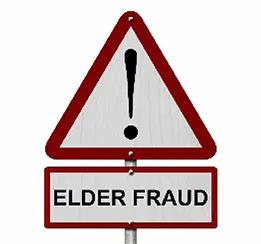
Bank News & Financial Literacy
Prevent Elder Fraud and Scams
Elder fraud is a type of elder financial abuse in which financial resources are misappropriated by a scammer or somebody close to the vulnerable adult. The Centers for Disease Control and Prevention states that 500,000 older Americans suffer elder abuse annually, with many cases being unreported. A study by MetLife indicated that vulnerable adults are losing at least $2.6 billion dollars annually. Don’t wait to act. The best way to protect yourself and others from financial elder abuse is by learning the signs and reporting it right away.

Common Types of Elder Fraud Scams
Elder fraud scams come in several forms. Here are some common ones to watch out for:
- Grandparent Scam - Scammer calls and claims to be a grandchild in trouble, requesting large sums of money be wired.
- Government Imposter Scam - Scammer claims to be a representative of a government agency that you trust using a number that appears official.
- False Investment Scam - Scammer poses as a financial advisor and calls unannounced with a “lucrative” investment opportunity.
- Fake Tech Support Scam - Scammer pretends to be a representative of a company you trust and asks you to download software.
- Phishing Scam - An automated voice message says there’s a financial issue with one of your accounts and asks to verify.
- Sweepstakes/Lottery Scam - Scammer contacts you to say you’ve won a contest and asks for bank account information.
- Romance Scam - Scammer creates a fake profile on dating app or social media to lure you in and steal your money.
- Online Shopping Scams - Scammer sets up fake websites selling false products to try and steal money.

Tips for Avoiding Elder Fraud Scams
You can protect yourself and others from elder fraud scams by taking proper precautions.
- Be suspicious of unsolicited calls or messages.
- Set up identity theft protection and credit monitoring.
- Watch for spelling errors on websites when online shopping.
- Check credit reports.
- Don’t be tempted by high return investments.
- Don’t trust callers saying there is a “problem” or “prize”.
- Don’t download software from pop-ups.
- Only buy from safe, reputable websites.
- Set up banking alerts on your mobile phone.
- Never share your password with someone you don’t know.
If you feel you are a victim of elder fraud or are being targeted, report it by calling the Wisconsin Elder Abuse Hotline toll free at 1-833-586-0107

